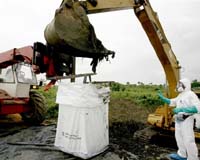| . |  |
. |
Rolla MO (SPX) Sep 21, 2009 Cheaper. Better. Faster. Most people will say you can't have all three. But don't tell that to Dr. Jianmin Wang, a professor of civil, architectural and environmental engineering at Missouri University of Science and Technology. Wang has created a wastewater system "in a box." Each system, built by re-purposing a shipping container, is low power, low maintenance and highly efficient. Built from weathering steel, these containers are designed to be tough and can be dropped on site by helicopters. The system's scorecard is so good that it could be deployed anywhere - from small, rural communities to forward operating bases, like those in Iraq or Afghanistan. Currently, the typical 600-soldier forward operating base requires a daily convoy of 22 trucks to supply the base with fuel or water and dispose of wastewater and solid waste. With few mechanical parts and a small footprint, the system is ideal for military use, Wang says. "Currently, human wastes are typically burned in burn pits, and the wastewater is usually hauled away and dumped by local contractors," Wang explains. "This results in high costs, security issues, potential health risks, negative environmental impacts to the hosting country and a potential negative image. "Moreover, almost all fresh water used in the camp - including water for drinking, bathing, showering, laundry, car washing and toilet flushing �- is from outside sources in the form of bottled and surface water. A deployable and easy-to-use water reclamation station, which transforms wastewater into reusable water within the base, would improve the base environment, security, soldiers' health, stewardship of foreign lands and concurrently reduce cost and fresh water demand from off-base sources." Current wastewater treatment options include membrane bioreactor, activated sludge, fixed film or on-site septic systems. Similar to these methods, Wang's process uses microorganisms to break down the organic pollutants. Membrane bioreactor, activated sludge process and fixed-film process have been built using standard shipping containers, too. But that's where the similarities end. The membrane bioreactor process, while similar in size and quality of effluent produced, has extremely higher energy and maintenance costs, and up to 10 times more expensive parts. "The fixed-film system, as developed by other companies, needs to be monitored and controlled constantly," Wang says. "Plus our system is much smaller than their systems - only 20-30 percent of the size of these systems for the same treatment capacity. Our system does not use any media, which significantly reduces construction and maintenance cost." Wang's system, named a baffled bioreactor (BBR) by Wang, modifies the conventional activated sludge process by using baffles to create a maintenance-free intermediate settling chamber for sludge return. It uses off-the-shelf, low-tech parts to treat wastewater at a level that exceeds federal standards. The water can be used for non-contact applications, including toilet flushing and car washing. Although this project is focused on military needs, Wang says the small, low-maintenance and low-power system makes sense for small communities, mobile home parks, motels and even facilities in remote areas, such as highway rest areas and camps. A few days ago, the U.S. Army approved Wang's request to demonstrate a full-scale, company-size water reclamation station for advanced wastewater and non-potable reuse. During this project, he will also explore the feasibility of producing potable water from wastewater in emergency situations. "A lesson learned from Hurricane Katrina is that untreated sewage can cause many health and psychological problems for displaced people," Wang adds. "The transportable, modular baffled reactor units could even be deployed to regions where natural disasters occur to quickly prevent untreated wastewater discharge and improve hygiene." Share This Article With Planet Earth
Related Links Missouri University of Science and Technology Our Polluted World and Cleaning It Up
 Ivory Coast toxic dump still claiming lives, say locals
Ivory Coast toxic dump still claiming lives, say localsAkouedo, Ivory Coast (AFP) Sept 19, 2009 Three years after a ship dumped toxic waste in Ivory Coast, residents of a village off the main city of Abidjan are still traumatised by untimely deaths they say are linked to poisoning. "We are living on borrowed time," said Bienvenue Danho, who is in charge of waste disposal at Akouedo, northeast of Abidjan, about the 2006 spill that caused 15 deaths and countless infections, according to ... read more |
|
| The content herein, unless otherwise known to be public domain, are Copyright 1995-2009 - SpaceDaily. AFP and UPI Wire Stories are copyright Agence France-Presse and United Press International. ESA Portal Reports are copyright European Space Agency. All NASA sourced material is public domain. Additional copyrights may apply in whole or part to other bona fide parties. Advertising does not imply endorsement,agreement or approval of any opinions, statements or information provided by SpaceDaily on any Web page published or hosted by SpaceDaily. Privacy Statement |